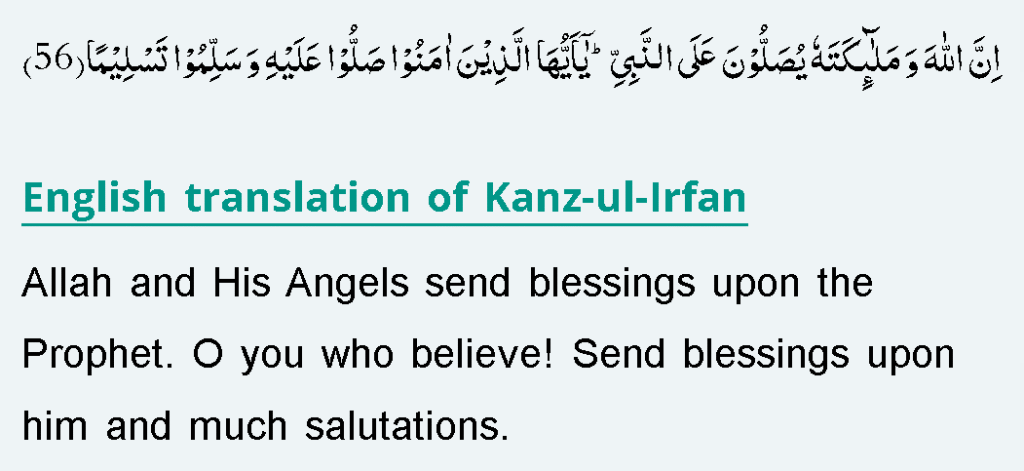In Islam, the practice of reciting Darood Sharif, or sending blessings upon Prophet Muhammad ﷺ, is a pillar of devotion and a source of immense spiritual reward. Unlike many other forms of worship that are established through the Sunnah, the command to send blessings upon the Prophet ﷺ has an even more profound origin: it is directly enjoined by Allah Almighty Himself in the Holy Quran. This divine injunction elevates Darood Sharif from a mere recommendation to a fundamental obligation for every believer.
This article will delve into the powerful Quranic command found in **Surah Al-Ahzab, verse 56**, which serves as the foundational basis for the practice of Darood Sharif. We will explore the wording of this sacred verse, understand its profound significance, and recognize why this unique divine order makes sending blessings upon Prophet Muhammad ﷺ an indispensable act of faith and a cornerstone of Islamic devotion.
Unveiling the Command: Surah Al-Ahzab (33:56)
The pivotal verse that commands believers to send blessings upon the Prophet ﷺ is:
إِنَّ اللَّهَ وَمَلَائِكَتَهُ يُصَلُّونَ عَلَى النَّبِيِّ ۚ يَا أَيُّهَا الَّذِينَ آمَنُوا صَلُّوا عَلَيْهِ وَسَلِّمُوا تَسْلِيمًا
“Innallaha wa malaa-ikatahu yusalloona ‘alan Nabiyi. Yaa ayyuhal-lazeena aamanoo salloo ‘alaihi wa sallimoo tasleema.”
“Indeed, Allah confers blessing upon the Prophet, and His angels [ask Him to do so]. O you who have believed, ask [Allah to confer] blessing upon him and greet him with [a worthy] greeting.” (Surah Al-Ahzab, 33:56)
Let’s break down the profound layers of this verse:
- “Indeed, Allah confers blessing upon the Prophet…”: This opening phrase is astonishing. It reveals that Allah, the Creator of the heavens and the earth, Himself sends blessings upon His Beloved Prophet ﷺ. This highlights the unparalleled status and honor bestowed upon Prophet Muhammad ﷺ by God.
- “…and His angels [ask Him to do so].”: Following Allah’s own act, His countless angels continuously send blessings upon the Prophet ﷺ. This signifies the universal reverence for the Prophet ﷺ across the celestial realms.
- “…O you who have believed, ask [Allah to confer] blessing upon him and greet him with [a worthy] greeting.”: After establishing His own and His angels’ practice, Allah directly commands the believers to join in this noble act. This makes sending blessings upon the Prophet ﷺ not merely a virtuous deed but a divine injunction, a direct order from Allah to those who claim to have faith.
This verse is the foundational source for the practice of Darood Sharif, making it an obligatory act of love and reverence for every Muslim. (Explore the history and origin of Darood Sharif).
The Profound Significance of This Divine Order
The command in Surah Al-Ahzab (33:56) holds immense significance for several reasons:
- Uniqueness: It is unique among all commands in the Quran. Allah commands us to pray, fast, give charity, etc., but when it comes to the Prophet ﷺ, Allah first states that He and His angels are already doing it, and then commands believers to join. This elevates the act of sending blessings to an unparalleled status.
- Honoring the Prophet ﷺ: This verse is the ultimate testament to the exalted status of Prophet Muhammad ﷺ. Allah Himself honors him, signifying his supreme position in the sight of God.
- Mandatory Nature: The use of the imperative “salloo” (ask [Allah to confer] blessing) denotes a clear command, making it an obligation (wajib) for Muslims to send blessings upon the Prophet ﷺ, at least in certain contexts like Salah.
- Connection to Obedience: By sending blessings, believers are directly obeying a divine order, which itself is an act of immense worship and draws them closer to Allah.
This Quranic injunction establishes Darood Sharif as a cornerstone of Islamic practice and a direct link to divine favor.
Understanding “Blessings” (Salat) in this Context
The word “Salat” (صلاة) when used in the context of Darood Sharif has different meanings depending on who is performing the act:
- From Allah: When Allah sends “Salat” upon the Prophet ﷺ, it means He bestows His mercy, honor, exaltation, and praises him in the highest assembly.
- From Angels: When angels send “Salat,” it refers to their prayers for mercy and forgiveness for the Prophet ﷺ, and their glorification of him.
- From Believers: When believers send “Salat,” it is a supplication (Dua) to Allah to confer His mercy, blessings, and honor upon the Prophet ﷺ. It is an expression of our love, respect, and gratitude.
This multi-faceted understanding of “Salat” deepens our appreciation for the act of sending blessings upon the Prophet ﷺ.
The Purpose and Wisdom Behind the Command
The divine command to recite Darood Sharif is imbued with immense wisdom and serves several crucial purposes for believers:
- Gratitude: It is a profound way of expressing gratitude to Allah for sending Prophet Muhammad ﷺ as a mercy to mankind, and to the Prophet ﷺ himself for conveying the divine message and enduring hardships for the Ummah.
- Spiritual Growth: Consistent recitation purifies the heart, removes sins, and elevates one’s spiritual ranks, leading to a deeper connection with the Divine. (Explore the spiritual benefits of daily Darood Sharif).
- Fostering Love and Reverence: It cultivates and deepens our love and reverence for Prophet Muhammad ﷺ, which is an integral part of faith and essential for following his Sunnah. (Understand the profound importance of Darood Sharif in a Muslim’s life).
- Intercession: Abundant blessings upon the Prophet ﷺ are a means of earning his intercession (Shafa’at) on the Day of Judgment.
Thus, the Quranic command for Darood Sharif is a comprehensive act that benefits the individual believer in countless ways.
Practical Implications for Muslims
The Quranic command has direct and significant implications for the daily lives of Muslims:
- Daily Worship: It makes Darood Sharif a fundamental part of daily worship, either through formal prayers or personal remembrances.
- Salah (Prayer): It forms the basis for reciting Darood-e-Ibrahimi in the final sitting (Tashahhud) of every Salah, making it an obligatory part of the most important pillar of Islam. (Learn about Darood-e-Ibrahimi’s profound significance).
- Dua Acceptance: It emphasizes the critical role of Darood Sharif in the acceptance of supplications (Duas), as mentioned in various Hadith. (Understand the connection between Darood Sharif and Dua acceptance).
- Emphasis on Friday: It reinforces the special encouragement to increase Darood Sharif on Friday, as our blessings are presented to the Prophet ﷺ on this blessed day. (Understand the benefits of Darood Sharif on Friday).
A Cornerstone of Faith and Devotion
The Quranic command in Surah Al-Ahzab (33:56) is not merely a recommendation but a foundational pillar for every Muslim. It underscores the unparalleled status of Prophet Muhammad ﷺ and establishes the act of sending blessings upon him as a direct divine injunction.
By consistently fulfilling this command, believers not only express their love and reverence for the Prophet ﷺ but also unlock countless blessings from Allah, purify their hearts, and strengthen their connection with the Divine. Let us strive to make the recitation of Darood Sharif, in obedience to this powerful Quranic command, a constant and cherished practice in our lives. May Allah enable us to always send blessings upon His Beloved Messenger ﷺ abundantly and sincerely.

